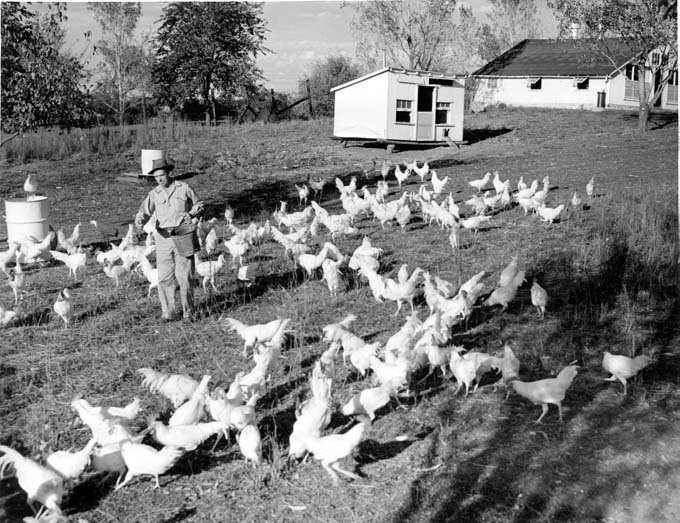 **
**
My great-grandparents grew up on a farm. They had a large garden plot, a small house and a few rambling structures for animals. As a boy, I didn’t like visiting the farm; I thought it was smelly and run-down. Their house and kitchens didn’t have any nice, new items from the store. Their home and everything in it was simple and well-used. By modern standards they lived a “rough” life without many modern conveniences. They were quite old when I saw them but seemed happy with their slow life and went about their work in a with a sort of gentle firmness. They were doing what had to be done each day and they would get it done. They were friendly and kind, but never lavished me with attention, sweets or presents. I was glad when I could get back in our modern car and drive back to civilization.
Looking back, I now realize how impressive their life really was. Nearly all their food came from the large garden and the animals in the fields and pens. What they didn’t make they could barter for. They hardly ever went to the store. Even in their old age, their health was astounding. They worked hard every day well into their nineties and never went to a doctor, and rarely to a dentist. They never went to a convalescent home. They took care of themselves until right up to the end. They passed in their sleep without enduring cancer or heart disease. In many ways they had achieved a level of health, vitality, longevity, and self-sufficiency that even modern “successful” people have trouble attaining. Although they never traveled the world or fulfilled a “bucket list,” I’m confident they can look back on their life with satisfaction, knowing they lived it fully with little to be ashamed of.
I think many aspects of our modern life would surprise them. They might even laugh at at the many stores and restaurants we frequent so often we “can’t live without them.” If the power went out our lives would get real hard real fast; Their homestead would largely keep right on going, although many aspects would be affected, they could work around it.
Sometimes we think preparedness means a well-stocked food storage room, but that’s really just an extension of our modern store mentality—notice it’s called home “storage.” Like savings, stored supplies go fast if you don’t have an income stream. Fortunately, it’s not hard to put food on the table if you learn to grow a garden now and in prolonged hard times.
Gardening requires much more than a #10 can of stored seeds in your shelter. At a minimum you’ll need fertile ground, reliable water and experience.
How much land do you need? Depending on your climate, 50 feet x 50 feet will be plenty for a vegetable garden. You’ll need a half acre for serious food growing, but even a quarter acre can provide a year’s worth of food for a small family if you have good gardening experience and carefully lay out trees and fruit-bearing bushes. Advanced techniques like greenhouses, container gardens or hydroponic systems (growing plants in water) can produce more food per square foot, but they require extra knowledge and equipment. If you live in a severe climate, or have limited water you might need one of these systems. Get it early and practice using it.
Don’t take your water supply for granted. Most famines come from a lack of water. Hopefully your strategic retreat will have a gravity-fed water source so it isn’t dependent on pumps and electricity. Properties with springs or above-ground streams are good if they flow year-round, otherwise consider a pond or cistern. Wells with windmill or solar-driven pumps can also be reliable. Much less water is needed if you use a drip watering system that just puts it where you want it (and not to the weeds). Soaker hoses, drip irrigation and automatic timers are worth the small investment. Mulching around plants keeps water in and weeds down. A good compost pile can provide mulch and nutrients from yard and garden waste.
Gardening takes experience, especially if you have a limited growing season. Fortunately, you don’t have to be a master gardener to start out. Beans, peas, radishes and zucchini come up easily with basic care. Crops that need to be started indoors (depending on your climate) like tomatoes and peppers are more challenging, but well worth the effort. Some crops we routinely see in the store require other techniques to grow like grapes, strawberries, celery, asparagus, herbs and grains. Expand to grow what you like to eat or learn to like what grows well in your area.
Yes, it’s cheaper and easier to get produce at the store, but you’ll find that even “Organic” can’t compare to the taste, quality and freshness of what you pull in from your backyard. In the meantime enjoy the fresh air and the exercise. Don’t give up if your first try ends up in a weed patch. Cover it with leaves and mulch and try again next year. Someday you’ll laugh that you ever actually paid for zucchini.